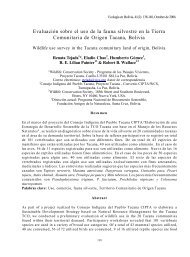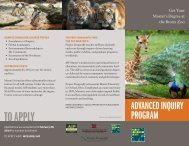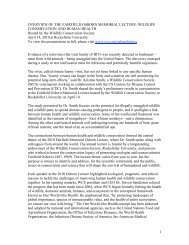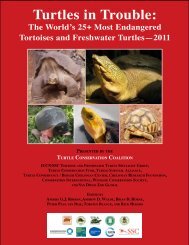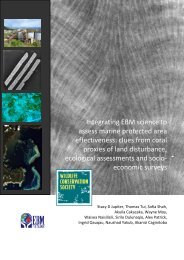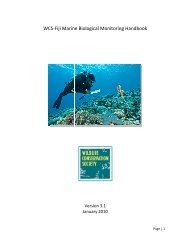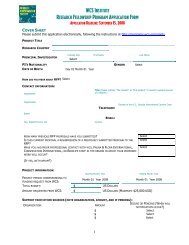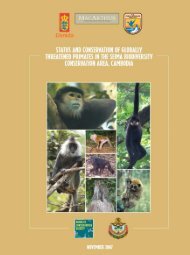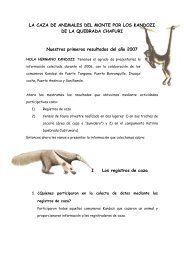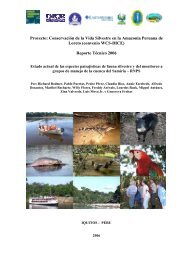WCS Annual Report 2012 - Wildlife Conservation Society
WCS Annual Report 2012 - Wildlife Conservation Society
WCS Annual Report 2012 - Wildlife Conservation Society
Create successful ePaper yourself
Turn your PDF publications into a flip-book with our unique Google optimized e-Paper software.
16<br />
wildlife conservation society <strong>Annual</strong> <strong>Report</strong> <strong>2012</strong><br />
/ <strong>WCS</strong> Digital Programs<br />
<strong>WCS</strong> digital efforts expanded significantly<br />
in <strong>2012</strong>. With growth of more than 26<br />
percent, our constituent base was able<br />
to show its support for <strong>WCS</strong>, its parks,<br />
and its programs through advocacy, fundraising,<br />
ticket and membership sales,<br />
and even by the purchase of a cocoa<br />
roach – a 100 percent dark chocolate<br />
representation of a Madagascar hissing<br />
cockroach, produced as a Valentine’s<br />
Day promotion.<br />
Overall, our efforts generated more<br />
than 965,000 emails to Congress,<br />
other elected officials, and agencies in<br />
support of legislative initiatives such<br />
as: reauthorization of the Multinational<br />
Species <strong>Conservation</strong> Funds Semipostal<br />
Stamp Reauthorization Act, which would<br />
continue the Save Our Vanishing Species<br />
stamp created in 2011; the National<br />
Bison Legacy Act, which would make the<br />
American bison our National Mammal<br />
and establish an annual National Bison<br />
Day in November; continued USAID Biodiversity<br />
Funding; and recommendations<br />
to the Bureau of Land Management for<br />
energy development in Alaska’s National<br />
Petroleum Reserve that balances energy<br />
extraction with protection of critical<br />
wildlife and habitat.<br />
Our online campaigns raised awareness<br />
and funding in support of a variety<br />
of threatened species, including orangutans,<br />
elephants, gorillas, and tigers.<br />
Online efforts also played a critical role<br />
in raising both awareness and financial<br />
support for recovery and rebuilding<br />
efforts at the New York Aquarium in the<br />
wake of Hurricane Sandy. Finally, online<br />
ticket and membership sales for the<br />
zoos and aquarium grew by 22 percent<br />
with significant web and email support.<br />
That discussion is in large part due to the<br />
broad environmental vision of Myanmar’s new<br />
president, U Thein Sein. In his September 2011<br />
inaugural address, Thein Sein promised to<br />
“take measure in various sectors to reduce air<br />
and water pollution, control dumping of industrial<br />
waste, and conserve wildlife.” Six months<br />
later, he suspended work on the Myitsone Dam,<br />
a $3.6 billion project financed by China that<br />
threatened to create a reservoir larger than<br />
the area of Singapore. Then, in January <strong>2012</strong>,<br />
the government cancelled a 4,000-megawatt,<br />
Thai-financed coal-burning power plant.<br />
These were not one-off decisions. The nation’s<br />
parliament has passed green legislation mandating<br />
environmental and social impact assessments,<br />
and a new Department of Environmental <strong>Conservation</strong><br />
will implement the new laws. In July<br />
<strong>2012</strong>, during a visit by U.S. Secretary of State<br />
Hillary Clinton, Myanmar committed to become<br />
a signatory to the Extractive Industry Transparency<br />
Initiative. The group of environmental<br />
experts convened by <strong>WCS</strong> in January <strong>2012</strong><br />
identified 132 Key Biodiversity Areas throughout<br />
the country. These results are the first steps<br />
in a process of government and civil society<br />
working together for biodiversity conservation.<br />
With millions of people dependent upon<br />
Myanmar’s natural resource base, the environmental<br />
sector is at the heart of the country’s<br />
future. The international community has an<br />
unprecedented opportunity to support and<br />
build a Myanmar-led process for sustainable<br />
development of the country’s vast natural<br />
resources. With assistance, Myanmar has<br />
the chance to succeed — where many of its<br />
Southeast Asian neighbors have failed — and<br />
become a regional model for linking environmental<br />
sustainability and economic growth.<br />
Busting Ivory Poachers and Traders<br />
<strong>WCS</strong> field staff across Africa and Asia have<br />
followed the growing elephant carcass count<br />
with alarm. They have seen how roads built for<br />
the logging and mining industries are providing<br />
poachers access to wildlife and links to distant<br />
markets. 2011 was the worst year on record for<br />
elephant deaths since ivory trade was banned in<br />
1989. <strong>2012</strong> saw a surge in ivory demand in Asia,<br />
where global criminal networks are pushing wild<br />
elephants ever closer to extinction. Eight out of<br />
10 elephants today die as a result of poaching.<br />
<strong>WCS</strong> works with partners across the trade<br />
chain, from the wild areas in Africa and Asia<br />
where elephants still roam, to the markets of<br />
Vietnam and China. We are developing and<br />
implementing scientifically-based law enforcement<br />
monitoring systems that are successfully<br />
controlling poaching in the sites where they are<br />
fully implemented. As a result, some of the few<br />
places across Central and East Africa where<br />
elephant numbers have been maintained are<br />
<strong>WCS</strong>-monitored sites.<br />
We are developing intelligence networks around<br />
our elephant sites in Asia to detect and apprehend<br />
poachers and illegal wildlife traders. We are<br />
partnering with the authorities to ensure that<br />
these individuals are prosecuted in court and<br />
given appropriate sentences. We are working


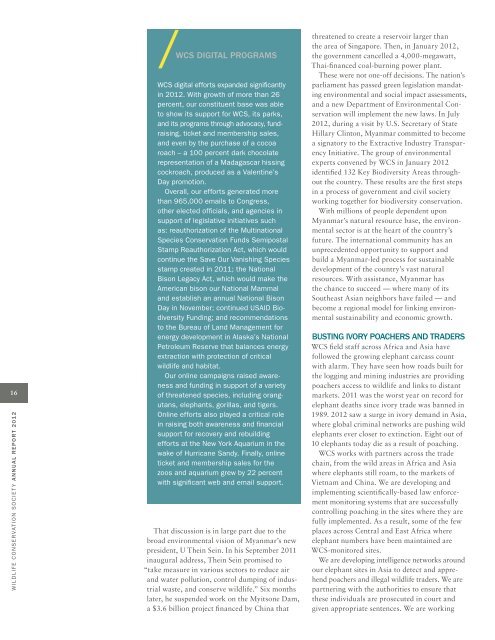
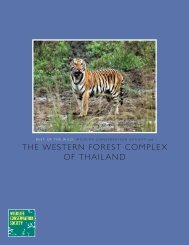
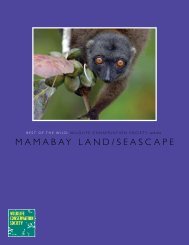
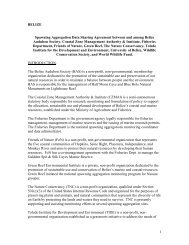
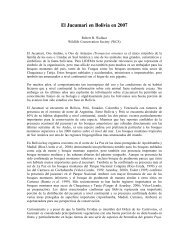
![RaLand / SeaScape [PDF] - Wildlife Conservation Society](https://img.yumpu.com/49974326/1/190x245/raland-seascape-pdf-wildlife-conservation-society.jpg?quality=85)
